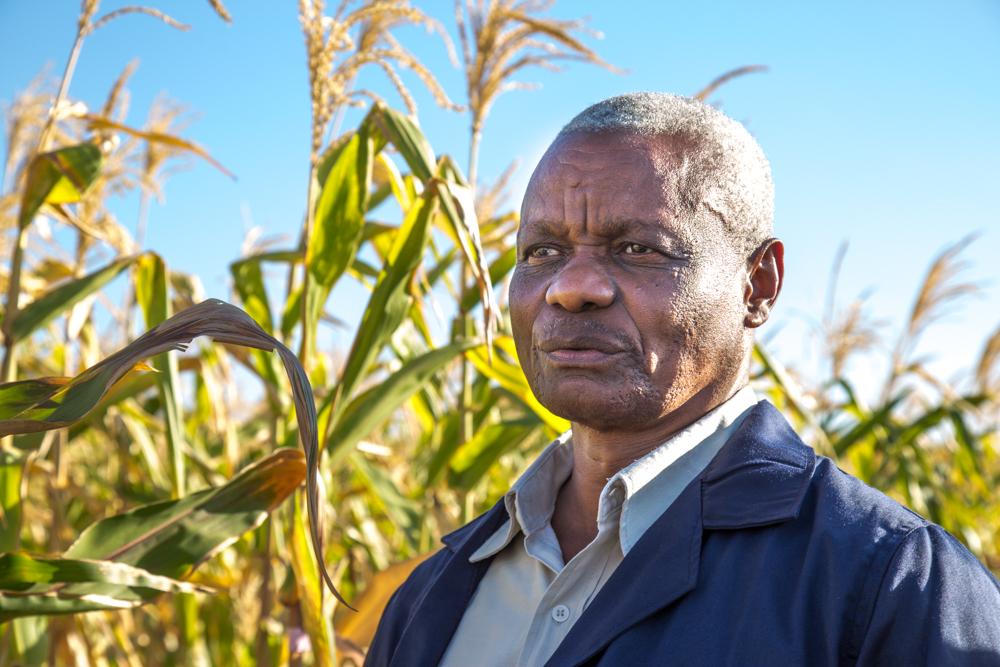Tanzania’s first-ever genetically modified crop a field trial of drought-tolerant maize intended to benefit small-scale farmers suffering the effects of climate change is proceeding well and will be harvested imminently, according to scientists overseeing the trial for the Water Efficient Maize for Africa (WEMA) project.

Dr. Alois Kullaya, technical advisor to the WEMA project in Tanzania, told the Alliance for Science during a recent field visit to the confined field trial (CFT) site near the capital, Dodoma, that he was confident the added drought gene will perform as intended. However, he cautioned that a definitive conclusion will need to await scientific data produced by the trial.
“From the general appearance, we think the genetically modified drought-tolerant hybrids are going to do better than the non-genetically modified,” Kullaya said. “We can say for sure when we have harvested and the results are out. But it looks very convincing.”
WEMA researchers will measure the size and weight of maize cobs and kernels, and expect the overall yield to be higher from plants with the drought-tolerant gene than those without the added trait.
Some 95 percent of the maize grown in Tanzania is produced on small-scale farms, Kullaya pointed out, and WEMA “is intended to benefit the small-scale farmers.”

Dr. Nicholas Nyange, advisor to the Tanzanian branch of the Open Forum for Agricultural Biotechnology in Africa (OFAB), welcomed the WEMA trial. “As I look to [this trial] there is a lot of hope that we can deliver this long-awaited drought-tolerant variety to benefit our poor resource farmers in our country,” he told the Alliance for Science.
The distribution of drought-tolerant maize is particularly urgent in the region because most of eastern and southern Africa is suffering intense drought conditions, aggravating food insecurity in many areas. As maize is mostly grown as a subsistence crop, poor harvests due to drought can lead directly to hunger and malnutrition for poorer families.
“We see the effect of climate change is becoming drier and the droughts are becoming more frequent,” Kullaya told the Alliance for Science. “Here in Dodoma, where we are standing now, should be in the middle of the rainy season. But it has not rained. Farmers have not been able to plant.”
Tanzania is one of five African countries involved in the WEMA project. Until recently, researchers were unable to conduct field trials in Tanzania because of restrictive legislation termed strict liability, which effectively blocked scientific research. Similar restrictive legislation, anti-GMO activist campaigns and other forms of red tape continue to hamper WEMA’s progress in Mozambique, Uganda and Kenya, three of the participating countries in eastern and southern Africa.

Only South Africa has moved to commercialize GM WEMA maize, which was distributed to farmers for the first time at the end of 2016. Other countries, including Tanzania, have been able to distribute first-generation conventionally-bred WEMA maize under the brand Drought TEGO.
Because it was produced using conventional breeding, Drought TEGO has not been subject to restrictive anti-GMO legislation, and is already helping smallholder farmers gain higher yields in dry conditions. WEMA researchers believe it is important to have both conventional and GM technology brought together in the same hybrid to deliver the best drought tolerance for smallholder farmers in Africa.
“In 2016, a year that did not experience sufficient rainfall, farmers who planted demonstration plots of WEMA Drought TEGO hybrids were able to harvest two to two and half tons per hectare of maize compared less than one ton for those who planted their preferred varieties,” according to Kullaya.
Genetically modified WEMA hybrids could be in the hands of Tanzania farmers by about 2021, Kullaya said, although he emphasized the nation s strict liability laws would need to be further amended before environmental release could take place. “You need to test it in multiple sites, at least three sites, in the environment, in the ecology where you want to release it,” Kullaya told the Alliance for Science.
The drought-tolerant gene added to the genetically modified maize originates from the soil bacterium Bacillus subtilis. Future GM WEMA hybrids will also carry the insect-resistant Bt gene stacked alongside the drought gene, helping farmers to protect against corn borer attacks without applying insecticides to control the pest.
Although both the Bt and drought genes remain the intellectual property of Monsanto, the WEMA hybrid varieties have been developed in Africa and are owned by the African Agricultural Technology Foundation in Nairobi and national plant science institutions. WEMA hybrids will be offered to farmers royalty-free and at an equivalent cost to conventional hybrids, and multiple seed companies will be licensed to produce hybrid maize seed for sale at competitive rates.
